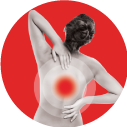
May 1st, 2018, with its motto "NEVER TOO EARLY, NEVER TOO LATE," was observed as World Asthma Day. This life-threatening disease is a major area of concern, and the World Health Organisation has estimated a staggering 235 million people are impacted by asthma symptoms. Other reports have put this number at almost 300 million. Let's just go to the detailed summary about asthma, its symptoms, causes and preventions.
What is Asthma?
It is a chronic infection of the lungs where the bronchial tubes narrow, inhibit, and reduce airways, causing difficulty in breathing. Asthma in the family tends to increase the propensity for risk for other family members. The severity and frequency of asthmatic conditions change.
Whereas the milder form of asthma symptoms may not require very aggressive intervention, those suffering from Chronic Obstructive Pulmonary Disease (COPD) could even need Intensive Care Treatment. COPD is treatable but not curable. Hence, an imperative need for early detection.
Asthma Symptoms
1. When your asthma flares up, the common asthma symptoms include Breathlessness
2. Coughing (which may not go away and often occurs or worsens at night or early morning)
3. Wheezing (whistling sound heard when breathing in or out)
4. Feeling of tightness in the chest or chest hurts (feeling that something is squeezing or sitting on your chest)
5. Shortness of breath (feeling as though you can't catch your breath).
These symptoms can vary both in frequency and severity.
Asthma Triggers or Causes
Asthma triggers vary from person to person. Asthma caused by air pollution is perhaps the most significant and crucial factor causing this disease. The need for clean, pristine air needs no emphatic assertion. Asthma caused by allergies like dust mites is another cause rated very high on this matrix. Among other reasons are
1. Viral infections,
2. Iced drinks,
3. Frozen foods, and
4. Tobacco
Notable changes in temperatures from severe cold to hot have been known to cause spasms, leading to worrying aggravation. Asthma symptoms could also be aggravated by swine flu or zika viruses. Managing your asthma and avoiding asthma triggers play a crucial role and can prevent an asthma attack.
Asthma Prevention, Treatment and Tests
Instead of just coping with your asthma symptoms, it is important to know your triggers and minimise your exposure to them.
There are two main lung function tests:
1. Peak Flow Measurement: This test measures the peak flow metre using a simple hand-held device and can be done at home. It indicates how fast you can force air out of your lungs, and the readings are mostly gauged as a percentage of how your lungs work at their best or personal best peak flow.
2. Asthma spirometer Test: A spirometry test, using an asthma spirometer at the doctor's clinic, measures how much and how quickly a person can forcibly exhale air. It is normally done to ascertain the extent of the damage. It is measured in percentage and is called forced expiratory volume (FEV).
There are various asthma remedies and treatments, which include relievers and preventers, including inhalers, puffers, or tablets. Controlled long-term medications include inhaled corticosteroids, which help reduce or eliminate asthma flares and treat airway inflammation that results in asthma symptoms. Inhalers contain a fast-acting medication needed to quickly open your airways and make breathing easier. The composition, frequency, and dosage should be taken after due consultation with a doctor because asthma inhaler side effects can be harmful too.
Thermoplasty, a procedure involving tube insertion into the lungs with an attached camera, imparting frequency waves into the airways, generating heat for comfort, is a well-established form of treatment.
These medications may have common side effects such as hoarseness of the voice or fungal throat infections.
Alternatively, herbs for asthma treatment involving cinnamon, honey, licorice, freshly grated ginger, and turmeric are known to provide relief. Such remedies may be cumbersome and are likely to be time-consuming. PhytoRelief CC, a natural, clinically proven sugar-free lozenge containing turmeric, ginger, and pomegranate extracts, has been developed using Alchemy Life's Phyto Advance technology and offers relief from asthma symptoms, throat infections, sore throats, scratchy throats, throat pain, or whooping cough, aiding ease in breathing.
Needless to add, this disease, with grave consequences, needs focused medical assistance and intervention!
The article is based on the information available to the public and which the author believes to be true. The author is not disseminating any information which the author believes or knows to be confidential or in conflict with the privacy of any person. The views expressed or information supplied through this article are mere opinions and observations of the author. The author does not intend to defame, insult, or cause loss or damage to anyone, in any manner, through this article.




































